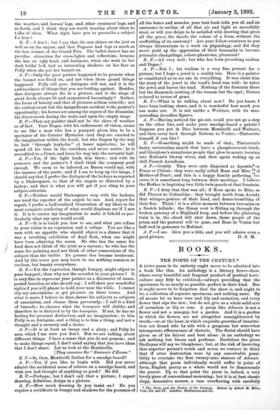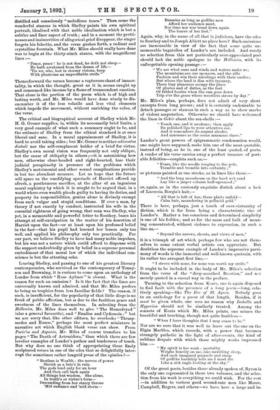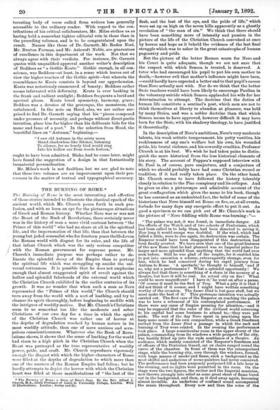BOOKS.
•
THE POETS OF THE CENTURY.*
A LONG poem in its entirety ought never to be admitted into a book like this. An anthology is a literary flower-show, where every beautiful and fragrant product of poetical horti- culture may fitly be exhibited,—always providing that the specimens be as nearly as possible perfect in their kind. But it ought never to be forgotten that the show is, and ought to be, a collection of separate specimens, and nothing more. By all means let us have rose and lily and carnation, and every flower that sips the dew ; but do not give us a whole solid acre of carnation or lily or rose. A poem like Adonais is not a flower and not a nosegay, but a garden. And it is a garden in which the flowers are not altogether unneighboured by weeds,—or, at the least, in which exquisite growths of imagina- tion are found side by side with a gorgeous but somewhat intemperate efflorescence of rhetoric. The florist should have given us of his fairest and best alone: in an anthology we ask nothing but bloom and perfume. Doubtless the pious Shelleyan will say we blaspheme; but, at the risk of incurring that superior person's wrath and scorn, we venture to think that if utter destruction were by any conceivable possi- bility to overtake the first twenty-nine stanzas of Adonais although that poem individually would suffer in point of form, English poetry as a whole would not be disastrously the poorer. Up to that point the poem is, indeed, a very lovely piece of conventional mourning; but it is at best classic elegy, decorative sorrow, a vase overflowing with carefully • The Poets and the Poetry of the Century. Edited by Alfred H. Mlles. Vols. III. and IV. London : Hutchinson and Co.
distilled and consciously "melodious tears." Then come the wonderful stanzas in which Shelley paints his own spiritual portrait, idealised with that noble idealisation which is but a subtler and finer aspect of truth ; and in a moment the pretti- nesses and insincerities of allegorical grief disappear, the singer forgets his falsetto, and the verse gushes forth, a radiant and crystalline fountain. What Mr. Miles should really have done was to begin at the thirty-ninth stanza, with the magnificent lines :-
"Peace. peace ! he is not dead, he doth not sleep— He lath awakened from the dream of life- 'Tis we, who, lost in stormy visions, keep With phantoms an unprofitable strife "
Thenceforward the verses become a rapturous chant of immor- tality, in which the thought, great as it is, seems caught up and consumed like incense by a flame of transcendent emotion.
That alone is the portion of the poem which is of high and lasting worth, and Mr. Miles would have done wisely to dis- encumber it of the less volatile and less vital elements which impede the movement, without enriching the value, of the verse.
The critical and biographical account of Shelley which Mr. H. G. Groser supplies, is, within its necessarily brief limits, a very good example of what such a summary ought to be, and the estimate of Shelley from the ethical standard is at once
liberal and sane. In a moral appraisement of Shelley, it is hard to avoid taking sides ; but Mr. Groser is neither advocates diaboli nor the self-complacent holder of a brief for virtue.
Shelley's own moral vision was frequently not only oblique, but the cause of obliquity in others ;—it is astonishing how men, otherwise clear-headed and right-hearted, lose their judicial perspicacity in presence of the problems which Shelley's matrimonial and other sexual complications provide in but too abundant measure. Let us hope that the future will awe us the unedifying spectacle of Harriet offered up afresh, a posthumous sacrifice, at the altar of an ingenious moral sophistry by which it is sought to be argued that, in a world where even wealth pleads guilty to having its duties, and property its responsibilities, genius alone is divinely exempt from such vulgar and stupid conditions. If ever a man, by theory if not exactly by conduct, instructed his wife in the essential rightness of going wrong, that man was Shelley, who yet, in a memorable and powerful letter to Southey, bases his attempt at self-exculpation in the matter of his desertion of Harriet upon the fact—or at least upon his professed belief in the fact—that his pupil had learned her lesson only too well, and applied his philosophy only too practically. For our part, we believe Shelley to have had many noble impulses, but his was not a nature which could afford to dispense with the support undoubtedly given by belief in a supreme personal embodiment of that moral law of which the individual con- science is but the attesting echo.
Leaving Shelley, and passing to one of his greatest literary contemporaries, who survived as the contemporary of Tenny- son and Browning, it is curious to come upon an anthology of Landor from which "Rose Aylmer" is absent. What is the reason for such an omission ? Is it the fact that the lines are universally known and admired, and that Mr. Miles prefers to bring us trophies from less familiar fields ? The reason, if such, is insufficient, for the popularity of that little dirge is no freak of public affection, but is due to the faultless grace and
sweetness of the lines themselves. In selecting from the Hellenics, Mr. Miles does well to give " The Hamadryad " (also a general favourite), and " Enallos and Cydomeia ; " but we are sorry that, like other editors, he overlooks " Thrasy- medes and Eanoe," perhaps the most perfect miniature in narrative art which English blank verse can show. From Pericles and Aspasia, Mr. Miles of course transfers to his
pages " The Death of Artemidora," than which there are few lovelier examples of Landor's pathos and tenderness of touch. But why does no one think of appropriating those finely sculptured verses in one of the odes that so delightfully inter- rapt the sometimes rather languid prose of the epistles ?-
"Restless is Wealth ; the nerves of power Shrink as a lute's in rain.
The gods lend only for an hour And then call back again All things but wisdom. She alone, In truth's or virtue's form— Descending from her starry throne
'Mid radiance and 'mid storm—
Remains as long as godlike men Afford her audience meet, Nor time nor war tread down again The traces of her feet."
Again, why, in the name of all that is judicious, have the odes
to Southey and to Joseph Ablett no place here ? Such omissions are inexcusable in view of the fact that some quite un- memorable bagatelles of Landor's are included. And surely
no selection from this not particularly over-appreciated poet should lack the noble apologue to the Hellenics, with its unforgettable opening passage :— " We are what suns and winds and waters make us; The mountains are our sponsors, and the rills Fashion and win their nurslings with their smiles ; But where the land is dim with tyranny,
There tiny pleasures occupy the place Of glories and of duties, as the feet Of fabled faeries when the sun goes down Trip o'er the grass where wrestlers strove by day."
Mr. Miles's plan, perhaps, does not admit of very short excerpts from long poems ; and it is certainly undesirable to detach passages or stanzas in such a way as to show marks
of violent amputation. Otherwise we should have welcomed the lines in Gebir about the sea-shells :- "Touch one, and it awakens ; then apply
Its polished lips to your attentive ear, And it remembers its august abodes, And murmurs as the ocean murmurs there."
Landor's great powers of epigrammatic condensation would, one might have supposed, make him one of the most quotable, instead of being, as he is, one of the least quoted, of poets. A reader of his verse carries away a perfect treasure of port- able felicities—couplets such as,— "Pears, like the needle verging to the pole, Tremble and tremble into certainty ;" or pictures painted at one stroke, as in lines like these,- " And the long moonbeam on the hard wet sand Lay like a jasper column half-upreared ;" or, again, as in the curiously exquisite distich about a lock of Lucrezia Borgia's hair,- " All that is left of her, these plaits unfold— Calm hair, meandering in pellucid gold."
There is here, perhaps, just a touch of over-virtuosity of diction, which is far from being a characteristic vice of Landor's. Rather a too conscious and determined simplicity is one of his foibles ; and as for the mass and bulk of mean-
ing concentrated, without violence to expression, in such a line as,— "Beyond the arrows, shouts, and views of men," it is a triumph of art which perhaps few who are not them• selves to some extent verbal artists can appreciate. But doubtless the supreme example of Landor's impressive parsi-
mony of words is the immortal and well-known quatrain, with its rather too arrogant first line,-
" I strove with none, for none was worth my strife."
It ought to be included in the body of Mr. Miles's selection from the verse of the "deep-mouthed Boeotian," and not merely quoted in a casual way in the preface.
Turning to the selection from Keats, one is again disposed to find fault with the presence of a long poem—long, rela- tively speaking—like The Eve of St. Agnes. Nobody goes to an anthology for a poem of that length. Besides, if it must be given whole, one sees no reason why Isabella and Hyperion should not be similarly treated. Among the
sonnets of Keats which Mr. Miles prints, one misses the beautiful and touching, though not quite faultless-
" When I have thoughts that I may cease to be."
Nor are we sure that it was well to leave out the one on the Elgin Marbles, which records, with a power that becomes
strangely pathetic in the light of after-events, the kind of sublime despair with which those mighty works impressed him .-
"My spirit is too weak : mortality Weighs heavily on me, like unwilling sleep, And each imagined pinnacle and steep Of godlike hardship tells me I must die Like a sick eagle looking at the sky."
Of the great poets, besides those already spoken of, Byron is the only one represented in these two volumes, and the selec- tion from his work is everything we could wish. For the rest —in addition to various good second-rate men like Moore, Campbell, Rogers, and others—we have here a large and in- teresting body of verse culled from writers less generally accessible to the ordinary reader. With regard to the con- tributions of his critical collaborators, Mr. Miles strikes us as having held a somewhat tighter editorial rein in these than in the preceding volumes, and is to be congratulated upon the result. Names like those of Dr. Garnett, Mr. Roden Noel, Mr. Buxton Forman, and Mr. Ashcroft Noble, are guarantees of excellence in this department of the work. Not that we always agree with their verdicts. For instance, Dr. Garnett quotes with unqualified approval another writer's description of Beddoes as " a Gothic Keats." Gothic enough, in all con- science, was Beddoes—•at least, in a sense which leaves out of view the higher reaches of the Gothic spirit—but wherein the resemblance to Keats consists is beyond our apprehension. Keats was notoriously enamoured of beauty; Beddoes rather seems infatuated with deformity. Keats is ever basking in the frank and radiant sunlight ; Beddoes frequents a lurid and spectral gloom. Keats loved symmetry, harmony, grace ; Beddoes was a devotee of the grotesque, the monstrous, the unbalanced. In the note on Hood, also, we are rather sur- prised to find Dr. Garnett saying that his "pieces composed under pressure of necessity, and perhaps without direct poetic intention, place him far higher than his deliberate bids for the name and fame of a poet." In the selection from Hood, the beautiful lines on "Autumn," beginning,—
" I saw old Autumn in the misty morn Stand shadowless like Silence, listening To silence, for no lonely bird would sing Into his hollow ear from woods forlorn," ought to have been admitted. Blake, had he come later, might have found the suggestion of a design in that fantastically
immaterial personification.
Mr. Miles's work is not faultless, but we are glad to note that these two volumes are an improvement upon their pre- cursors in the matter of textual and typographical accuracy.
















































 Previous page
Previous page